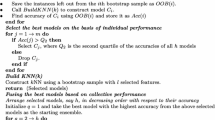Abstract
This paper introduces a new ensemble approach, Feature-Space Subdivision (FaSS), which builds local models instead of global models. FaSS is a generic ensemble approach that can use either stable or unstable models as its base models. In contrast, existing ensemble approaches which employ randomisation can only use unstable models. Our analysis shows that the new approach reduces the execution time to generate a model in an ensemble with an increased level of localisation in FaSS. Our empirical evaluation shows that FaSS performs significantly better than boosting in terms of predictive accuracy, when a stable learner SVM is used as the base learner. The speed up achieved by FaSS makes SVM ensembles a reality that would otherwise infeasible for large data sets, and FaSS SVM performs better than Boosting J48 and Random Forests when SVM is the preferred base learner.
Preview
Unable to display preview. Download preview PDF.
Similar content being viewed by others
References
Asuncion, A., Newman, D.J.: UCI repository of machine learning databases. University of California, Irvine (2007)
Breiman, L.: Bagging Predictors. Machine Learning 24, 123–140 (1996)
Breiman, L.: Random forests. Machine Learning 45, 5–32 (2001)
Frank, E., Hall, M., Pfahringer, B.: Locally Weighted Naive Bayes. In: Proc. of the 19th Conf. on Uncertainty in AI, pp. 249–256 (2003)
Ho, T.K.: The Random Subspace Method for Constructing Decision Forests. IEEE Trans. Pattern Analysis and Machine Intelligence 20(8), 832–844 (1998)
Kohavi, R.: Scaling Up the Accuracy of Naive-Bayes Classifiers: a Decision-Tree Hybrid. In: Proc. of the 2nd KDD, pp. 202–207 (1996)
Kohavi, R., Li, C.H.: Oblivious Decision Trees, Graphs, and Top-Down Pruning. In: Proc. of 1995 Intl. Joint Conf. on Artificial Intelligence, pp. 1071–1077 (1995)
Opitz, D.: Feature selection for ensembles. In: Proc. of the 16th AAAI, pp. 379–384 (1999)
Oza, N.C., Tumer, K.: Input Decimation Ensembles: Decorrelation through Dimensionality Reduction. In: Kittler, J., Roli, F. (eds.) MCS 2001. LNCS, vol. 2096, pp. 238–247. Springer, Heidelberg (2001)
Pavlov, D., Mao, J., Dom, B.: Scaling-up support vector machines using the boosting algorithm. In: Proc. of 2000 Intl. Conf. on Pattern Recognition, pp. 219–222 (2000)
Schapire, R.E., Singer, S.: Improved boosting algorithms using confidence-rated predictions. Machine Learning 37, 297–336 (1999)
Tao, D., Tang, X., Li, X., Wu, X.: Asymmetric bagging and random subspace for support vector machines-based relevance feedback in image retrieval. IEEE Trans. on Pattern Analysis and Machine Intelligence 28(7), 1088–1099 (2006)
Witten, I.H., Frank, E.: Data Mining: Practical machine learning tools and techniques, 2nd edn. (2005)
Zheng, Z., Webb, G.I.: Lazy Learning of Bayesian Rules. Machine Learning 41(1), 53–84 (2000)
Author information
Authors and Affiliations
Editor information
Editors and Affiliations
Rights and permissions
Copyright information
© 2009 Springer-Verlag Berlin Heidelberg
About this paper
Cite this paper
Ting, K.M., Wells, J.R., Tan, S.C., Teng, S.W., Webb, G.I. (2009). FaSS: Ensembles for Stable Learners. In: Benediktsson, J.A., Kittler, J., Roli, F. (eds) Multiple Classifier Systems. MCS 2009. Lecture Notes in Computer Science, vol 5519. Springer, Berlin, Heidelberg. https://doi.org/10.1007/978-3-642-02326-2_37
Download citation
DOI: https://doi.org/10.1007/978-3-642-02326-2_37
Publisher Name: Springer, Berlin, Heidelberg
Print ISBN: 978-3-642-02325-5
Online ISBN: 978-3-642-02326-2
eBook Packages: Computer ScienceComputer Science (R0)




